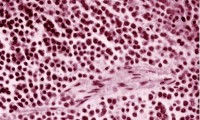-
J&J Adds Another Bispecific Antibody for Atopic Dermatitis With $1.25B Acquisition
- Source: drugdu
- 109
- May 31, 2024
-
Study reveals pivotal role of the circadian clock in enhancing checkpoint inhibitor cancer therapy
- Source: drugdu
- 130
- May 30, 2024
-
CNS-Focused Rapport Therapeutics Preps IPO to Back Phase 2-Ready Epilepsy Drug
- Source: drugdu
- 83
- May 21, 2024
-
J&J expands dermatology portfolio with $850m Proteologix acquisition
- Source: drugdu
- 84
- May 21, 2024
-
J&J’s Megadyne discontinues pediatric electrode pad after burn reports
- Source: drugdu
- 78
- May 15, 2024
-
BigHat Biosciences partners with Janssen Biotech
- Source: drugdu
- 109
- May 5, 2024
-
AstraZeneca’s Lynparza to dominate PARP inhibitors market with $4 bn in sales by 2027
- Source: https://www.expresspharma.in/astrazenecas-lynparza-to-dominate-parp-inhibitors-market-with-4-bn-in-sales-by-2027-globaldata/
- 167
- May 4, 2024
-
FDA Approves Stelara Biosimilar Selarsdi to Treat Psoriasis, Psoriatic Arthritis
- Source: drugdu
- 78
- April 19, 2024
-
Rallybio and J&J collaborate to tackle maternal-foetal blood disorder
- Source: drugdu
- 108
- April 13, 2024
-
Cell Therapy Now Set to Reach More Patients With Expanded FDA Nod for 2 Multiple Myeloma Drugs
- Source: drugdu
- 98
- April 10, 2024
your submission has already been received.
OK
Subscribe
Please enter a valid Email address!
Submit
The most relevant industry news & insight will be sent to you every two weeks.













